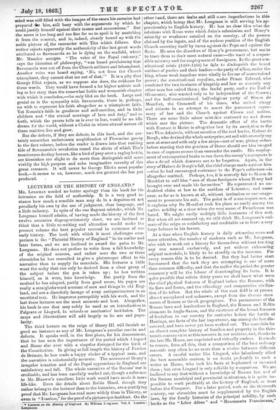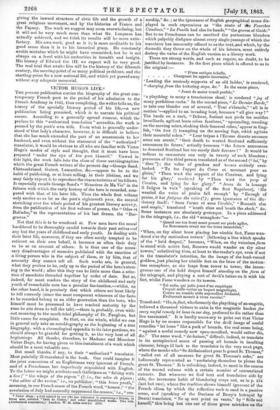LECTURES ON THE HISTORY OF ENGLAND.* Ma. LONGMAN needed no
better apology than his book for his intrusion on the field of authorship. It is a very good in- stance how much a sensible man may do in a department not peculiarly his own by the use of judgment, clear language, and a little industry. In spite of the one flagrant mistake, which Mr. Longman himself admits, of having made the history of the first twelve centuries disproportionately short, we are inclined to think that a little re-writing and alteration would make the present volume the best popular manual in existence of our early history. The book with which it most challenges com- parison is the "Pictorial History of England" in its earlier and later forms, and we are inclined to award the palm to Mr. Longman. He does not profess to write from a full knowledge of the original sources, and rather uses the two or three chronicles he has consulted to give a picturesque effect to his narrative than to supply its materials. His lectures a little want the unity that can only be derived from a clear grasp of the subject before the pen is taken up ; he has written
himself, as it were, into knowledge. But partly from the method he has adopted, partly from good sense, his pages are really a straightforward account of men and things in old Eng- land, and not a disorderly farrago of stray antiquarianisrns in an uncritical text. He improves perceptibly with his work, and the last three lectures are the most accurate and best. Altogether, his book is one that may safely be used as an introduction to Palgrave or Lingard, in schools or mechanics' institutes. The maps and illustrations will add largely to its use and popu- larity.
The third lecture on the reign of Henry Ill. will furnish as good an instance as any of Mr. Longman's peculiar merits and defects. It speaks well, in the first place, for his discernment, that he has seen the importance of the period which 1 ingard and Hume slur over with a singular disregard for the birth of the Constitution. In giving at full length the history of Fawkes de Breaute, he has made a happy choice of a typical man, and the narrative is substantially accurate. The accounts of Henry's irregular taxation and of the Papal oppressions in England are satisfactory and full. The whole narrative of the Barons' war is creditable, and has been carefully worked out, though a reference to Mr. Blaaww's excellent little work would have made it more life-like. Even the details about Robin Hood, though they rather belong to the lecturer than to the historian, are a gratifying proof that Mr. Longman has read more widely than in Thierry, or even in "Ivanhoe," for the proof ofa picturesque incident. On the
• Lectures on the History of Engl unt. By William long Ina. voL L Landon : Longmana. •
other hand, there are faults and still u.ore imperfections in this chapter, which betray that Mr. Longman is still serving his ap- prenticeship to English history. 113 has no clear idea what the relations with RM110 were which John's submission and Henry's minority or weakness entailed on the country, of the powers claimed by the legate, and of the curious position of the English Church asserting itself by turns against the Pope and against the State. He sees the disorders of Henry's government, but omits to trace them to their most natural cause—the want of a respon- sible ministry and the employment of foreigners. In the great con- stitutioual crisis (1258-1260 he fails to distinguish the broad outlines of parties and their leaders—the party of Oleo, under the king, whose weak impulses were wholly in favour of unrestrained power ; the constitutional royalists, under Prince Edward, who, combined the two instincts of kingship and law as scarcely any other man has united them ; the feudal party, under the Earl of Gloucester, who wanted only to be independent of the Crown; and the half-constitutional, half-religious party of Siman do Montfort, the Cromwell of his times, who united clergy and citizens in an attempt to assert the paramount supre- macy of law and the Church against Crown and nobles. There are some little minor mistakes scattered up and down which mar the picture. The dramatic effect of time battle with Eustace he Moine is altogether lost by its ascription to the two Vice-Admirals, without mention of the real leader, Hubert de Burgh, who devised the whole enterprise, set sail with scarcely any men-at-arms and with only a few ships—not of war, giving orders before starting that the garrison of' Dover should see him hanged in case of capture sooner than surrender the castle. His employ- ment of extemporized beaks to run down the enemy's transports is also a detail which deserves not to be forgotten. Again, in the story of Hubert de Burgh's fall, the chief charge made against him —that he had encouraged resistance to the Pope's collectors—is altogether omitted. Perhaps, too, it is scarcely fair to Simon de Montfort to call him "one of those foreigners whom Henry had brought over and made his favourites." He represented an un- doubted claim at law to the earldom of Leicester, and came- over, as far as is known at all, without invitation or encourage- ment to prosecute his suit. The point is of some importmee, as it explains why De Montfort took his place so easily among the native nobility at a time when the very name of Frenchman was hated. We might easily multiply little instances of this sort. But when all are summed up, we still think Mr. Longman's esti- mate of the reign so satisfactory and creditable as to leave a very large balance in his favour.
At a time when English history is daily attracting more and more attention, the number of students such as Mr. Longman, who wish to work out a history for themselves without trusting- any one manual exclusively, and yet without exhausting original materials, is likely to be steadily on the increase. For every reason this is to be desired. But they had better start forewarned that the task they are attempting is one of more than common difficulty, and that the earlier the period the greater common'y will be the labour of disentangling. its facts. It is quite possible that within thirty years we shall know what were the chief physical features of England before the Romans, with its flora and fauna, and the ethnology and comparative civiliza- tion of its tribes. But the whole of this vast field is at presen almost unexplored and uuknown, except from the chance state ments of Roman or Greek geographers. The permanence of the- Roman laws and institutions in England, the Roman and 'Celtic- elements in Anglo-Saxon, and the existence of the broad features- of feudalism in our country for centuries before the battle of Hastings, are facts of the last importance, am among the last dis- covered, and have never yet been worked out. The materials for an almost complete history of families and property in the thir- teenth century exist at this moment in our archives, and, thanks to- the late Mr. Hume, are imprinted and virtually useless. It stands to reason, from all this, that a comparison of the best ordinary manuals may often be no more than a clmoice between different errors. A careful writer like Lingard, who laboriously sifted the best accessible sources, is no doubt preferable to such a writer as Hume, who took his facts at haphazard or invented them ; but even Lingard is only reliable by comparison. We are inclined to say that-without a knowledge of Roman law, and of the Roman municipal and provincial institutions, it is quite im- possible to work profitably at the history of England, at least before time Conquest. For a later period, such as the thirteenth century, our chronicles must be supplemented by time English laws, by the family histories of the principal nobility, by such books as the " Liber Albus " and " Monumenta Franciscana," giving the inward structure of civic life and the growth of a great religious movement, and by the histories of France and the Papacy. The work we suggest may seem overwhelming, but it will not be very much more than what Mr. Longman has actually achieved, and we think its results will be more satis- factory. His own work, good as it is, is more creditable to his good sense than it is to his historical grasp. Ho constantly avoids mistakes which he might have committed, but he is not always on a level with his authorities in breadth and insight. His history of Edward the III. we expect will be very good. The real trial that awaits him will be the history of the fifteenth century, the meeting-point of so many political problems, and the starting-point for a new national life, and which yet passed away without any adequate memorial.































 Previous page
Previous page